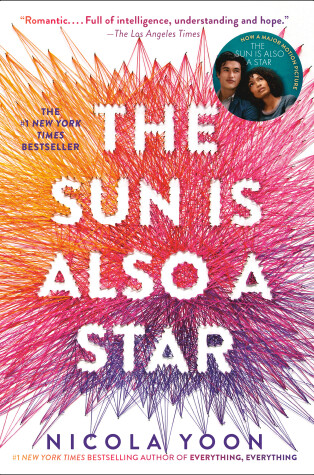Reviewed by jesstheaudiobookworm on
Let me start by saying that the hype for The Sun is Also A Star is 100% justified. This is the type of story I have been craving for so long. It addresses the incredibly sensitive, but also important topics of culture, diversity, and immigration. As someone whose ancestors immigrated to the US in the 1600s, I wasn’t able to relate with Natasha’s story in the same way that some others are, but that doesn’t mean that I didn’t appreciate it.
To say that hearing The Sun is Also A Star was an eye-opening experience for me would definitely be an understatement. Immigration and deportation are something that I’ve always thought of on a macro scale and I appreciate Nicola Yoon giving me (and other readers) the opportunity to consider these topics on a more micro/personal level.
The Sun is Also A Star features two main characters, Natasha and Daniel. The basic plot of the story centers around the fact that Natasha’s family is being deported to Jamaica after immigrating to the US illegally when Natasha was a child. Daniel is also the son of immigrant parents, although his story offers a different perspective on cultural background and family. Daniel and Natasha meet and form a surreal bond within 24 hours. Those 24 hours also happen to be Natasha’s last day in the United States.
The Sun is Also A Star is incredibly layered. Even if most high school seniors can’t specifically relate to Natasha’s deportation situation, they could probably relate to her as a high school senior. That was the level on which I connected with Natasha. Because, at the most basic level of the story, there is a teenager who’s facing being uprooted right before her senior year of high school. Anyone who has ever been in that situation, for whatever reason, will sympathize with Natasha.
And then there’s the more complicated issue of deportation. Being deported means Natasha can never come back to the United States. So the fact that she meets her potential soulmate on her last day in the country is all the more upsetting. Daniel’s story of struggling with cultural assimilation/preservation is a little more commonly told (but only a little). Daniel’s parents try very hard to instill a sense of Korean heritage in their sons, whom they feel are being lured away by mainstream American society. That, by itself, would make for an excellent story. I empathized with both Daniel and his parents to a certain degree (and maybe a little with his brother by the end).
Yoon wove Natasha’s and Daniel’s stories together using a string of events which had a domino effect on the characters’ lives. Natasha would have called them coincidences. Daniel would have seen them as fate. Ultimately, it is left to the reader’s discretion.
What really made the story standout to me, other than the memorable characters, were the brief “asides” sprinkled throughout the story. Yoon included occasional segments filled with background information about characters (major or minor) and cultural history. I found these segments incredibly informative and enlightening. They took this story to the next level and gave it additional depth and dimensionality.
Overall, I enjoyed The Sun is Also A Star a million times is more than Everything, Everything. Nicola Yoon has proven herself to be a more than capable storyteller. The Sun is Also A Star is such an important story with a beautifully abstract message. I’m sure that it speaks to each reader in a different way. The world needs more stories like this.
Narration review: Bahni Turpin, Raymond Lee, and Dominic Hoffman did right by this story. Turpin voiced Natasha, Lee voiced Daniel, and Hoffman read the alternative chapters (the “asides” and secondary characters). Having multiple narrators was a bold and appropriate choice for this story. I particularly appreciated the inclusion of Hoffman for the alternative segments. His narration of them was attention grabbing and alerted the listener to the upcoming change in pace. All three narrators provided excellent character distinction, especially accent-related distinction. There weren’t many accents to perform, but those that were performed were done so appropriately and respectfully (not stereotypically or garishly). This is especially important due to the sensitive nature of the topics being discussed. It wouldn’t be appropriate for an accent to come off as comical or offensive. ♣︎
Reading updates
- Started reading
- 18 January, 2017: Finished reading
- 18 January, 2017: Reviewed
